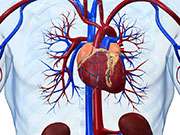Invasive strategy improves outcome in elderly with ACS

(HealthDay)—An invasive strategy using coronary angiography results in a better outcome in elderly patients with non-ST-segment elevation acute coronary syndrome (ACS), according to research published in the March 1 issue of The American Journal of Cardiology.
Gennaro Galasso, M.D., Ph.D., of Federico II University in Naples, Italy, and colleagues conducted an "as-treated" subanalysis of the Italian Elderly ACS trial to compare the outcome for patients receiving coronary angiography with coronary revascularization as needed (182 patients), or conservative treatment (CT) with medical therapy (131 patients), during initial hospitalization. The outcome was the composite of death, myocardial infarction (MI), disabling stroke, and repeat hospital stay for cardiovascular causes or bleeding within one year.
The researchers found that the composite outcome occurred in more patients in the CT group (40.5 percent) than in the invasive treatment group (24.7 percent; hazard ratio, 0.56; P = 0.003). Compared with the CT group, the invasive treatment group had lower rates of MI (6 versus 13 percent; hazard ratio, 0.43; P = 0.034) and the aggregate of death and MI (14.3 versus 27.5 percent; hazard ratio, 0.48; P = 0.004).
"In conclusion, elderly patients with non-ST-segment elevation acute coronary syndromes treated invasively experienced significantly better survival free from the composite of all-cause mortality, nonfatal MI, disabling stroke, and repeat hospitalization for cardiovascular causes or bleeding," the authors write.
More information:
Abstract
Full Text (subscription or payment may be required)
Copyright © 2015 HealthDay. All rights reserved.




















